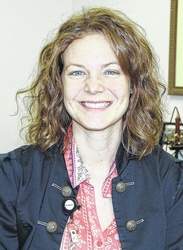 GALLIPOLIS — Holzer Hospice offers music therapy as part of their services to patients, and Leslie Shoecraft, neurologic music therapist, of Rhythm-N-You, spearheads the efforts for the program.
GALLIPOLIS — Holzer Hospice offers music therapy as part of their services to patients, and Leslie Shoecraft, neurologic music therapist, of Rhythm-N-You, spearheads the efforts for the program.
(See the Original Article on MyDailyTribune)
“Leslie is able to provide another avenue of self-expression for our patients, when they need it the most,” said Vicki Nottingham, program director of Holzer Hospice. “Oftentimes patients and family members are able to relive memories through song, creating a comfort during this time.”
“In some cases, I have been able to work with some high-functioning patients to write about their life and experiences,” Shoecraft said. “This provides the family with a positive memory for many years to come.”
According to Shoecraft, “Music is an essential part of improving the quality of life.”
While music has traditionally been thought of as soothing, relaxing, and pleasant to listen to, she said music therapy uses music to help with rehabilitation in several ways. It can provide help with pain relief and make necessary physical therapy a pleasant experience and not a chore.
Shoecraft said music therapy can improve speech in patients with speech problems through the use of rhythm and pitch exercises during singing. Recent neurological research suggests that singing uses parts of the brain other than the speech center, and music therapy can help retrain the brain’s pathways to improve speech, even if that part of the brain has been injured.
Music therapy can help gait and walking problems with the use of musical rhythm, especially those with Parkinson’s Disease. This improvement may last even after the music has stopped.
Often, temporary improvement in memory and communication in dementias (including Alzheimer’s) can be seen by having the patient sing familiar songs and then try to recall experiences related to the song, Shoecraft said.
Participation in the playing of musical instruments and composing songs can result in better patient cooperation in necessary physical exercise sessions. It also helps develop decision-making and socialization skills.
Of course, the object is to produce a pleasing musical sound with the instruments so that patients will want to participate. Music therapy uses music to encourage specific needed exercises, more socialization, and to improve activities of daily living. It does so in a pleasant, entertaining way. This does require a creative music therapist. The process often creates a bond with the patient who may need and appreciate this human concern.
The field of music therapy is still undergoing intensive research in how the brain works, in which findings may result in better treatments options for patients.
Music therapy referrals can be arranged by calling 740-446-5074.
